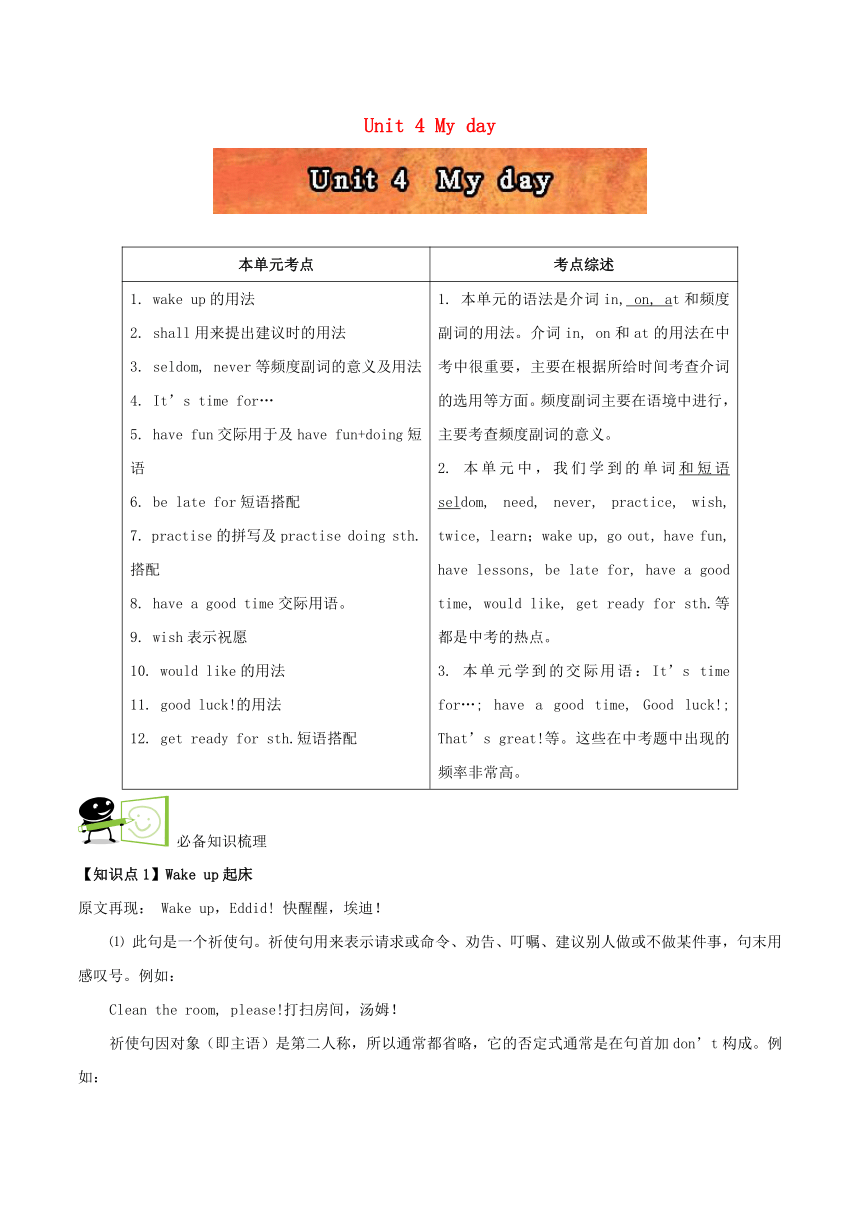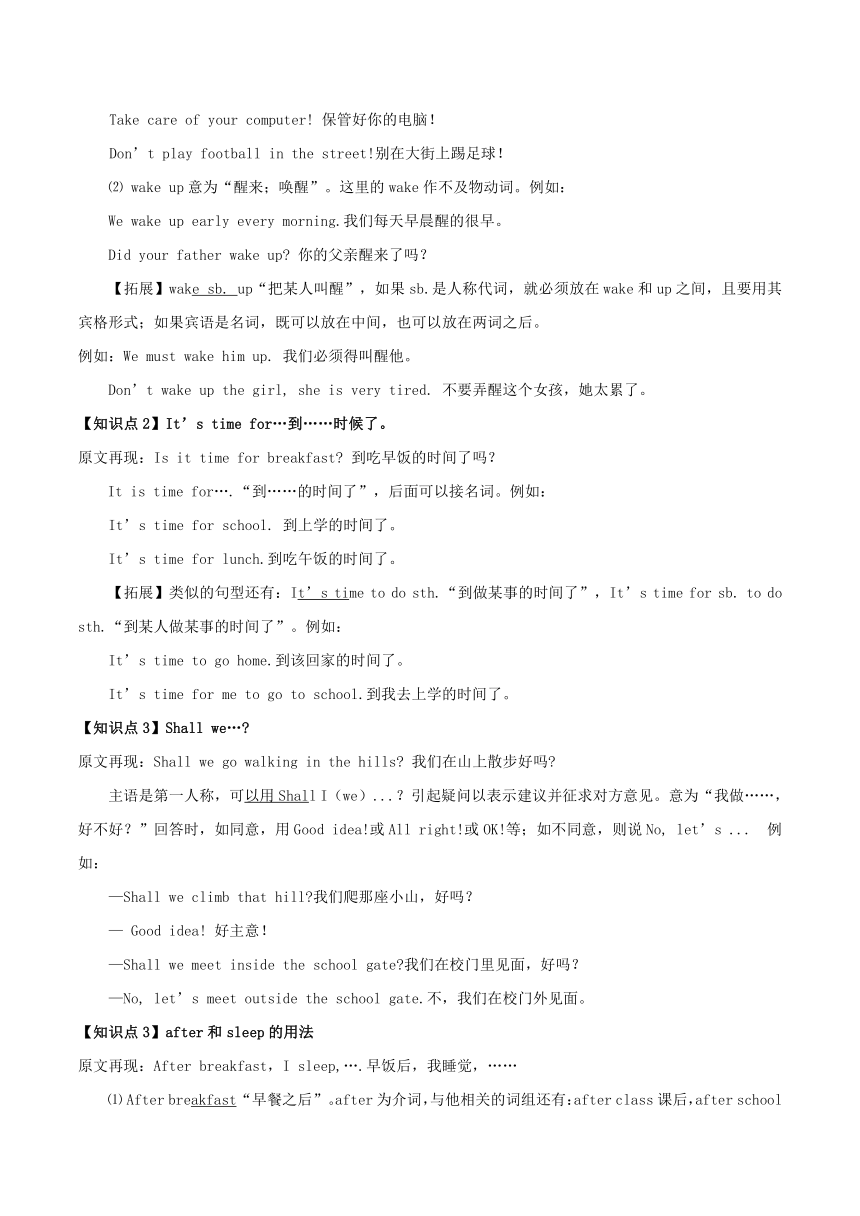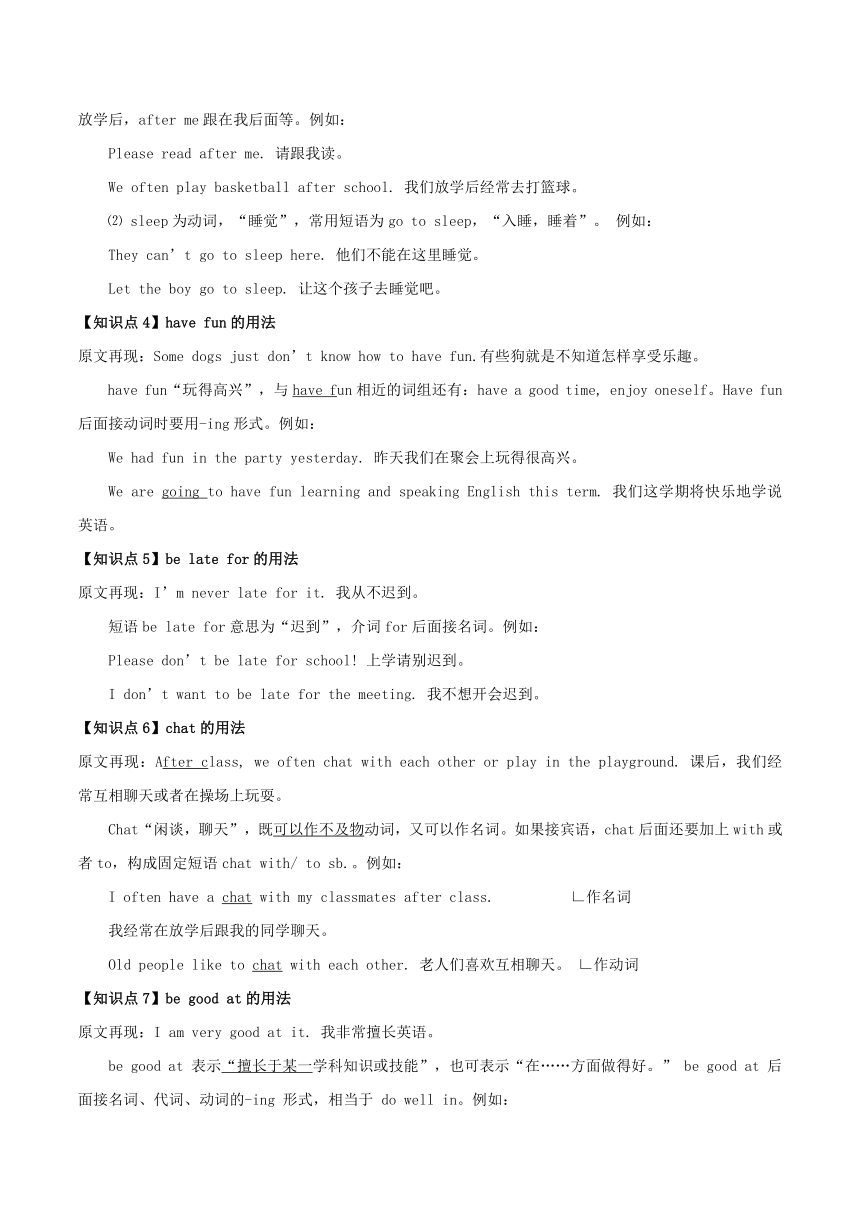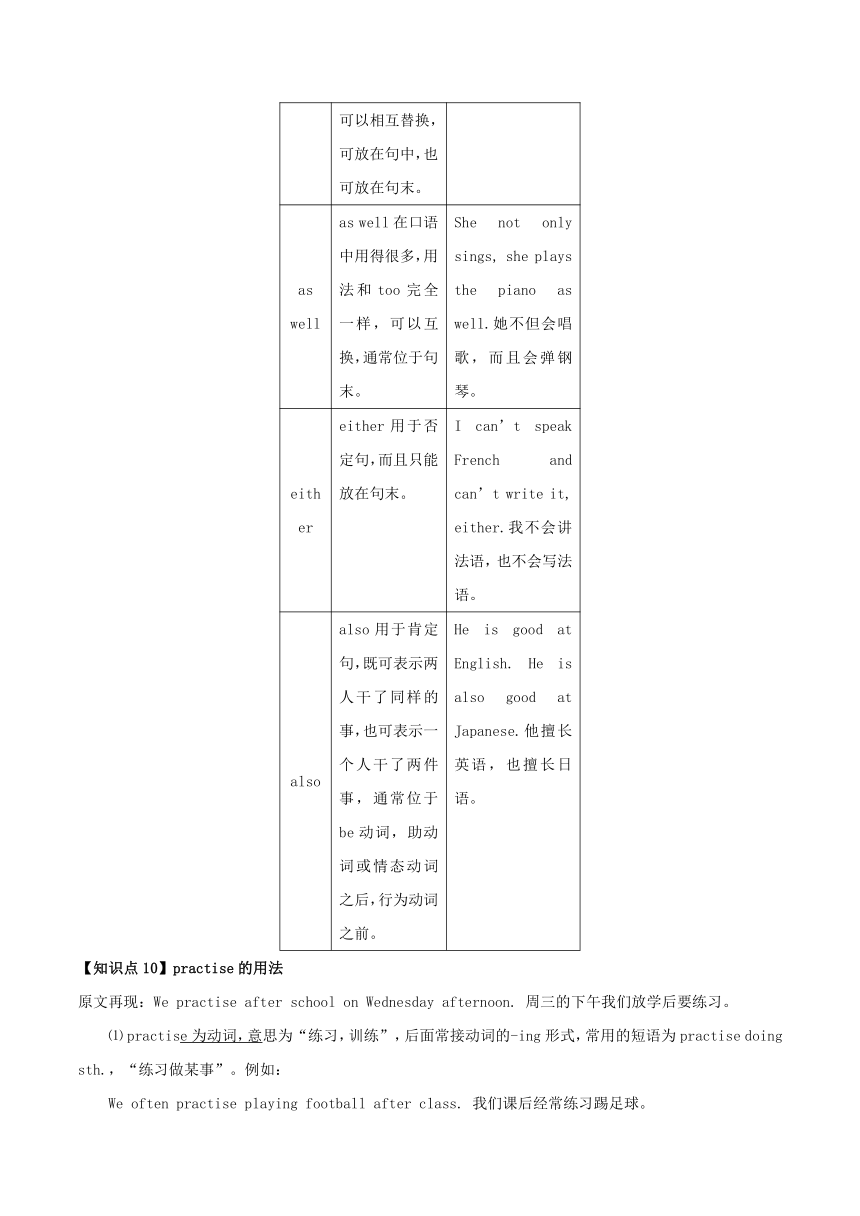Unit 4 My day 单元知识点整理学案
文档属性
| 名称 | Unit 4 My day 单元知识点整理学案 |

|
|
| 格式 | zip | ||
| 文件大小 | 196.8KB | ||
| 资源类型 | 教案 | ||
| 版本资源 | 牛津译林版 | ||
| 科目 | 英语 | ||
| 更新时间 | 2016-08-26 00:00:00 | ||
图片预览





文档简介
Unit
4
My
day
本单元考点
考点综述
1.
wake
up的用法2.
shall用来提出建议时的用法3.
seldom,
never等频度副词的意义及用法4.
It’s
time
for…5.
have
fun交际用于及have
fun+doing短语6.
be
late
for短语搭配7.
practise的拼写及practise
doing
sth.搭配8.
have
a
good
time交际用语。9.
wish表示祝愿10.
would
like的用法11.
good
luck!的用法12.
get
ready
for
sth.短语搭配
1.
本单元的语法是介词in,
on,
a
( http: / / www.21cnjy.com )t和频度副词的用法。介词in,
on和at的用法在中考中很重要,主要在根据所给时间考查介词的选用等方面。频度副词主要在语境中进行,主要考查频度副词的意义。2.
本单元中,我们学到的单词和短语sel
( http: / / www.21cnjy.com )dom,
need,
never,
practice,
wish,
twice,
learn;wake
up,
go
out,
have
fun,
have
lessons,
be
late
for,
have
a
good
time,
would
like,
get
ready
for
sth.等都是中考的热点。3.
本单元学到的交际用语:It’s
time
for…;
have
a
good
time,
Good
luck!;
That’s
great!等。这些在中考题中出现的频率非常高。
必备知识梳理
【知识点1】Wake
up起床
原文再现:
Wake
up,Eddid!
快醒醒,埃迪!
⑴
此句是一个祈使句。祈使句用来表示请求或命令、劝告、叮嘱、建议别人做或不做某件事,句末用感叹号。例如:
Clean
the
room,
please!打扫房间,汤姆!
祈使句因对象(即主语)是第二人称,所以通常都省略,它的否定式通常是在句首加don’t构成。例如:
Take
care
of
your
computer!
保管好你的电脑!
Don’t
play
football
in
the
street!别在大街上踢足球!
⑵
wake
up意为“醒来;唤醒”。这里的wake作不及物动词。例如:
We
wake
up
early
every
morning.我们每天早晨醒的很早。
Did
your
father
wake
up
你的父亲醒来了吗?
【拓展】wake
sb.
( http: / / www.21cnjy.com )up“把某人叫醒”,如果sb.是人称代词,就必须放在wake和up之间,且要用其宾格形式;如果宾语是名词,既可以放在中间,也可以放在两词之后。
例如:We
must
wake
him
up.
我们必须得叫醒他。
Don’t
wake
up
the
girl,
she
is
very
tired.
不要弄醒这个女孩,她太累了。
【知识点2】It’s
time
for…到……时候了。
原文再现:Is
it
time
for
breakfast
到吃早饭的时间了吗?
It
is
time
for….“到……的时间了”,后面可以接名词。例如:
It’s
time
for
school.
到上学的时间了。
It’s
time
for
lunch.到吃午饭的时间了。
【拓展】类似的句型还有:It’s
ti
( http: / / www.21cnjy.com )me
to
do
sth.“到做某事的时间了”,It’s
time
for
sb.
to
do
sth.“到某人做某事的时间了”。例如:
It’s
time
to
go
home.到该回家的时间了。
It’s
time
for
me
to
go
to
school.到我去上学的时间了。
【知识点3】Shall
we…
原文再现:Shall
we
go
walking
in
the
hills
我们在山上散步好吗
主语是第一人称,可以用Shal
( http: / / www.21cnjy.com )l
I(we)...?引起疑问以表示建议并征求对方意见。意为“我做……,好不好?”回答时,如同意,用Good
idea!或All
right!或OK!等;如不同意,则说No,
let’s
...
例如:
—Shall
we
climb
that
hill 我们爬那座小山,好吗?
—
Good
idea!
好主意!
—Shall
we
meet
inside
the
school
gate 我们在校门里见面,好吗?
—No,
let’s
meet
outside
the
school
gate.不,我们在校门外见面。
【知识点3】after和sleep的用法
原文再现:After
breakfast,I
sleep,….早饭后,我睡觉,……
⑴
After
breakfast
( http: / / www.21cnjy.com )“早餐之后”。after为介词,与他相关的词组还有:after
class课后,after
school放学后,after
me跟在我后面等。例如:
Please
read
after
me.
请跟我读。
We
often
play
basketball
after
school.
我们放学后经常去打篮球。
⑵
sleep为动词,“睡觉”,常用短语为go
to
sleep,“入睡,睡着”。
例如:
They
can’t
go
to
sleep
here.
他们不能在这里睡觉。
Let
the
boy
go
to
sleep.
让这个孩子去睡觉吧。
【知识点4】have
fun的用法
原文再现:Some
dogs
just
don’t
know
how
to
have
fun.有些狗就是不知道怎样享受乐趣。
have
fun“玩得高兴”,与have
f
( http: / / www.21cnjy.com )un相近的词组还有:have
a
good
time,
enjoy
oneself。Have
fun后面接动词时要用-ing形式。例如:
We
had
fun
in
the
party
yesterday.
昨天我们在聚会上玩得很高兴。
We
are
going
( http: / / www.21cnjy.com )to
have
fun
learning
and
speaking
English
this
term.
我们这学期将快乐地学说英语。
【知识点5】be
late
for的用法
原文再现:I’m
never
late
for
it.
我从不迟到。
短语be
late
for意思为“迟到”,介词for后面接名词。例如:
Please
don’t
be
late
for
school!
上学请别迟到。
I
don’t
want
to
be
late
for
the
meeting.
我不想开会迟到。
【知识点6】chat的用法
原文再现:After
c
( http: / / www.21cnjy.com )lass,
we
often
chat
with
each
other
or
play
in
the
playground.
课后,我们经常互相聊天或者在操场上玩耍。
Chat“闲谈,聊天”,既可以作不及物
( http: / / www.21cnjy.com )动词,又可以作名词。如果接宾语,chat后面还要加上with或者to,构成固定短语chat
with/
to
sb.。例如:
I
often
have
a
chat
with
my
classmates
after
class.
∟作名词
我经常在放学后跟我的同学聊天。
Old
people
like
to
chat
with
each
other.
老人们喜欢互相聊天。
∟作动词
【知识点7】be
good
at的用法
原文再现:I
am
very
good
at
it.
我非常擅长英语。
be
good
at
表示“擅长于某一
( http: / / www.21cnjy.com )学科知识或技能”,也可表示“在……方面做得好。”
be
good
at
后面接名词、代词、动词的-ing
形式,相当于
do
well
in。例如:
Mike
is
good
at
swimming.
迈克擅长于游泳。
I
am
good
at
English.
我擅长英语。
『辨析』be
good
at与do
well
in
be
good
at意思接近于do
( http: / / www.21cnjy.com )
well
in“在(某方面)出色;擅长……”。be
good
at
强调一种笼统情况,而do
well
in可表示一种情况,也可指在具体的一次活动中表现出色。例如:
Mary
is
good
at
math
( http: / / www.21cnjy.com )s.
=
Mary
does
well
in
maths.
玛丽数学很好(指情况)。=
玛丽数学学得很好。
Tom
did
well
in
th
( http: / / www.21cnjy.com )at
English
test.汤姆在那次英语考试中考得很好。(不宜用be
good
at.指具体一次)
【知识点8】be
all
nice
to…的用法
原文再现:They
are
all
nice
to
me.
他们都对我很好。
⑴
be
nice
to
sb.意为“
( http: / / www.21cnjy.com )对某人好”,是“be
+
adj.
+
to
sb.”结构,表示对某人的一种态度,用介词to,能用于这个结构的形容词还有friendly(有好的),
rude(粗鲁的),kind(善良的),
polite(有礼貌的)等。例如:
The
people
there
are
friendly
to
us.
那里的人们对我们很友好。
⑵
all意为“所有,全体”,是不定代词,放在动词之前,be动词之后。例如:
They
all
like
playing
football.他们都喜欢踢足球。
The
students
in
our
class
are
all
from
Nanjing.
我们的学生都来自南京。
【知识点9】also的用法
原文再现:I
also
like
playing
volleyball.
我也喜欢打排球。
also副词,“也”,与too同义。例如:
He
is
also
from
England.
他也是来自英国。
She
also
likes
dancing.
她也喜欢跳舞。
『辨析』too,
as
well,
either,
also区别
词组
区别
例句
too
too也,用于肯定句,比also更通俗,和also,
as
well可以相互替换,可放在句中,也可放在句末。
He
studies
hard
and
I
study
hard,
too.他学习用功,我(学习)也用功。
as
well
as
well在口语中用得很多,用法和too完全一样,可以互换,通常位于句末。
She
not
only
sings,
she
plays
the
piano
as
well.她不但会唱歌,而且会弹钢琴。
either
either用于否定句,而且只能放在句末。
I
can’t
speak
French
and
can’t
write
it,
either.我不会讲法语,也不会写法语。
also
also用于肯定句,既可表示两人干了同样的事,也可表示一个人干了两件事,通常位于be动词,助动词或情态动词之后,行为动词之前。
He
is
good
at
English.
He
is
also
good
at
Japanese.他擅长英语,也擅长日语。
【知识点10】practise的用法
原文再现:We
practise
after
school
on
Wednesday
afternoon.
周三的下午我们放学后要练习。
⑴
practise为动词,意
( http: / / www.21cnjy.com )思为“练习,训练”,后面常接动词的-ing形式,常用的短语为practise
doing
sth.,“练习做某事”。例如:
We
often
practise
playing
football
after
class.
我们课后经常练习踢足球。
Mr.
Wu
asks
us
to
practise
reading
English.
吴老师让我们经常练习读英语。
⑵on
Wednesday
afternoon“在星期三下午”,指在某个特定时间的上午/
下午/
晚上时,用介词on。例如:
I
usually
go
to
see
( http: / / www.21cnjy.com )
my
grandparents
on
Saturday
morning.
我经常在星期六上午去看我祖父母。
【知识点11】have
a
good
time的用法
原文再现We
always
have
a
good
time
at
school.
我们在学校总是玩得很开心。
have
a
good
time
玩得高兴,过得愉快,相当于enjoy
oneself。常用来对别人提出祝愿。例如:
We
had
a
very
good
time
at
the
evening
party.
我们在晚会上玩得很愉快。
I
hope
you
will
like
it
and
have
a
good
time.
希望你们会有一段美好的时光,玩得开心点。
【知识点12】介词in,
on,
at的用法
一、at,
in,
on表示时间的用法
1.
at表时间时,指在时间上的某一时刻。如:at
half
past
2
p.m.
2.
in表时间时,指一段时间或与
( http: / / www.21cnjy.com )年、月、季节时间连用。如:in
the
morning,in
the
afternoon,in
the
evening,但at
night例外。
3.
on表时间时,
( http: / / www.21cnjy.com )指在某一天或某一天的某个时间,尤指在星期几。如:on
Children’s
Day;on
Sunday
morning。
4.
表示较长的时间如星期、月、季、年、世纪等用in。如:in
July,in
summer。
二
、at,
in,
on表示地点的用
( http: / / www.21cnjy.com )法
1.
at表地点时,指空间位置上的某一点,后面常接小地方。如:at
the
bus
stop
2.
in表地点时,指在某一立体空间范围内,后面接大地方。
如:in
shanghai
3.
on表地点时,指某物与另一物表面相接触,或与某地方接壤等。如:on
the
table
【知识点13】频度副词的用法
频率副词是表示动作发生的频率,多与一般现在时连用。为了更加形象地说明它们的频率高低,我们可以用百分比来显示它们所表示的频率高低,请看图示:
( http: / / www.21cnjy.com )
频率副词词义并不难记,难就难在它们在句中应放在什么位置。下面小结几点规律:
◆通常位于行为动词前。例如:
1.
We
often
go
to
school
at
seven.
我们经常七点上学。
2.
Li
Lei
always
does
her
homework
in
the
evening.
李梅总是在晚上做作业。
3.
The
old
lady
seldom
leaves
her
house.
那个老太太很少出门。
◆放在系动词、情态动词或助动词后。例如:
1.
He
is
always
very
busy.
他总是很忙。
2.
I’ll
never
go
there.
我再也不到那儿去了。
◆有些频率副词可放在句首或句末以示强调。例如:
1.
Sometimes
he
doe
( http: / / www.21cnjy.com )s
it
this
way,
sometimes
he
does
it
that
way.
他有时这样做,有时那样做。
2.
I
have
not
been
to
Beijing
very
often.
我不经常去北京。
◆相关链接:
how
often通常用来对动作发生的频
( http: / / www.21cnjy.com )度提问,意为“多长;多久一次”。回答时使用的频度副词(组)有sometimes,
always,
often,
twice,
three
times
a
month,
never等。例如:
—How
often
do
you
shop 你多久购物一次?
—I
shop
once
a
week.一周一次。
【知识点14】would
like的用法
原文再现I
would
like
to
tell
you
about
my
life
here.
我想告诉你关于我的学校生活。
Would
like表示“想做某事”,wou
( http: / / www.21cnjy.com )ld
like主要用于婉转地提出请求、建议或某种看法。语气比want更委婉。would
like后面一般跟动词不定式,也可以跟事物名词。在表示建议或请求时,肯定回答常说Yes,
please/
Yes,
I’d
love(like)
to;否定回答常说No,
thanks.
例如:
①Would
you
like
something
to
eat 你想要吃的东西吗?
②—Would
you
like
to
go
shopping
with
me 你愿意和我一起去买东西吗?
—Yes,
I’d
love
to!
是的,我很原意。
③—Would
you
like
a
mooncake 吃块月饼好吗?
—No,
thanks.
不用,谢谢。
【知识点15】have
time的用法
原文再现Sandy
does
not
have
much
time
to
play
tennis.
桑迪没有很多的时间打网球。
have
time后面接动词不定式t
( http: / / www.21cnjy.com )o
do
sth.表示“有时间做某事”;have
no
time
to
do
sth.表示“没有时间做某事”。例如:
I
have
much
time
to
chat
with
you
on
Sundays.
星期天我有很多时间和你聊天。
We
have
no
time
to
stay
here.
我们没有时间呆在这儿。
【知识点16】good
luck!的用法
原文再现Wish
our
team
good
luck!
祝我们队好运!
good
luck意为“祝您好运
”,用于对别人或自己的祝福,可以单独使用。例如:
Wish
you
good
luck.
祝您好运。
I
wish
you
good
luck
and
great
success
in
the
coming
New
Year.
祝来年好运,取得更大的成就。
—Good
luck.
祝你好运。
—Thank
you,
Sir谢谢,先生
【知识点17】how
often的用法
原文再现—How
often
do
you
visit
a
museum
你多久参观一次博物馆?
—About
twice
a
month.
大概一月两次。
how
often意为“多长时间一次或
( http: / / www.21cnjy.com )每隔多久一次”,表示做某事的频率,常对once
a
week(month/
year),
every
day,
always,
usually,
sometimes,
often等表示频率的副词脱短语提问。例如:
—How
often
do
you
go
to
the
cinema
你多久去看一次电影?
—Twice
a
week.
每周两次。
【拓展】how
long,
how
soon,
how
often和how
far用法辨析
◇
how
long意为“多久、多长时间
( http: / / www.21cnjy.com )”主要是对一段时间进行提问,答语通常是(for)
three
days/weeks/months等时间段,它可用于各种时态。
—How
long
did
the
meeting
last?这个会开了多长时间?
—About
half
an
hour.
大约半小时。
◇
how
soon意为“还要多久
( http: / / www.21cnjy.com )”,是对从某个基本时间到将来某动作结束或其动作发生这段时间提问,常用在一般将来时态的句子中,答语通常是“in十段时间”。
—How
soon
will
the
road
be
finished?这条路要多久才能完工?
—In
a
few
months.
几个月之内。
◇
how
often意为“隔多久”
( http: / / www.21cnjy.com ),用来提问在某一特定的时间进行某个动作的次数,答语通常是always,
usually,
often,
sometimes,
once/twice
a
week/month等。
—How
often
do
you
visit
your
uncle
你要隔多久去拜访你叔叔一次?
—Once
a
week.每周一次。
◇
how
far
是指距离的长短。如果想问“你家里这里多远?”就要用how
far。例如:
—How
far
is
it
from
here
to
the
zoo
从这里到动物园有多远?
—It’s
6
kilometres.
六公里。
【知识点18】be
good
for的用法
原文再现They
are
good
for
us.
它们对我们有益。
be
good
for
sb.
( http: / / www.21cnjy.com )
“对某人有好处”。常用于It’s
good
for
sb
to
do
sth句型中,可译为“做某事对某人有好处”。其意义相反的句型为it’s
bad
for
sb
to
do
sth,译为“做某事对某人有害”。it在句型中是形式上的主语,其实真正的主语是to
do
sth。例如:
It
is
good
for
us
to
read
English
every
day.每天读英语对我们来说是有好处的。
It’s
bad
for
our
eyes
to
watch
too
much
TV.看太多的电视对我们的眼睛是有害的。
【知识点19】get
ready
for的用法
原文再现They
help
us
get
ready
for
the
day.
它们有助于我们为一天做好准备。
⑴
help“帮助,有助于”,既可以做动词,也可以做名词。例如:
Can
I
help
you
需要我帮忙吗?
∟做动词
We
can’t
finish
the
work
without
your
help.
∟做名词
没有你的帮助我们不可能完成项工作。
【拓展】
与help相关的一
( http: / / www.21cnjy.com )些短语有:help
sb
(to)
do
sth/help
sb
with
sth?“帮助某人做某事”。
例如:
Millie
often
( http: / / www.21cnjy.com )helps
(to)
do
my
homework.
=Millie
often
helps
with
my
homework.米莉经常帮我做家庭作业。
⑵
get
ready
for“为…..作
( http: / / www.21cnjy.com )准备”,是固定词组。get
ready
for=get
ready
to
do
sth。但是介词for后面要接代词、名词或动名词。例如:
We
are
getting
ready
for
the
party.我们都在为晚会做准备。
You
should
get
ready
to
write
the
story.你应当准备写这个故事了。
【知识点20】learn
about的用法
原文再现I
can
learn
a
lot
about
the
world.
我可以多了解世界。
learn动词,“了解,获悉,学习,学会”等
( http: / / www.21cnjy.com )。后面既可以接动词不定式to
do
sth,也可以接动名词doing
sth。与learn常搭配的短语有learn
about….“了解,获悉”,learn
from
sb“向某人学习”。例如:
You
should
learn
more
about
the
man.你们应当更多地了解这个人。
We
should
learn
from
each
other.我们应该互相学习。
【知识点21】too
much的用法
原文再现We
always
have
too
much
homework.
我们总是有太多的家庭作业。
too
much意为“太多”,用作形容词后接不可数名词。例如:
He
drinks
too
much
wine
every
day.他每天喝酒太多了。
too
much也可以用作代词,代替上文提到过的不可数名词。例如:
Don’t
eat
too
much.
不要吃得太多。
【拓展】too
much和much
too
too
much用来修饰不可数名词或修饰动词,表示程度;much
too意为“太……”,用来修饰形容词或副词。例如:
Watching
too
much
is
bad
for
your
eyes.电视看得太多,对你的眼睛有害。
It
is
much
too
cold
today.
今天太冷了。
直通中考
★经典考题解读
【考点1】考查介词on的用法
(四川成都)—Jim,
when
were
you
born
—I
was
born
______
October,
1988.
A.
in
B.
at
C.
on
【解析】本题考查介词的用法。在具体的某年、某月前用in;在某一天之前用on;在某一时刻前用at。故本题选A。
【答案】A
【考点2】考查频度副词never的用法
(辽宁大连)I know a lot about my pen
friend although we’ve ______
met before.
A.
often
B.
always
C.
never
D.
usually
【答案】C
【考点3】考查good
morning交际用语
(山东东营)Though
they
are
( http: / / www.21cnjy.com )far
away
from
school,
the
children
who
live
in
mountains
______
go
to
school
on
foot.
A.
ever
B.
always
C.
never
D.
hardly
ever
【解析】考查交际用语。句意“
( http: / / www.21cnjy.com )尽管他们远离学校,但是住在山上的孩子们总是步行去上学。”
A.
曾经
B.
总是C.
从不D.
几乎不,结合句意选择B。
【答案】B
【考点4】考查have
a
good
time交际用语
(山东潍坊)—I’ll
go
to
France
for
a
holiday
next
month.
—Great!
______!
A.
Good
luck
B.
Best
wishes
C.
Glad
to
see
you
again
D.
Have
a
good
time
( http: / / www.21cnjy.com )【答案】D
【考点5】考查good
luck!交际用语
(山东莱芜)—
I
will
have
a
math
test
tomorrow.
—
______
A.
Good
luck!
B.
Thank
you!
C.
Well
done!
D.
The
same
to
you!
【解析】考查交际口语用法辨析。G
( http: / / www.21cnjy.com )ood
luck!
祝你好运!Thank
you!谢谢!Well
done!
干得好!The
same
to
you!
你也一样!句意:—
明天我数学考试。—祝你好运!所以选择答案A。
【答案】A
【考点6】考查how
often及应答语
(山东菏泽)—How
often
do
you
chat
with
your
friends
online
—______
I’m
busy
with
my
study.
A.
Only
one
month.
B.
About
twice
a
month.
C.
Almost
every
day.
D.
Maybe
in
two
weeks.
【解析】考查副词。句意:—你多久一次和你的
( http: / / www.21cnjy.com )朋友在网上聊天?—大约每月两次,我要忙于我的学习。问句中的how
often表示“多久一次”,是用来提问频率的。根据I’m
busy
with
my
study可判断选项C不符合句意。
【答案】B
4
My
day
本单元考点
考点综述
1.
wake
up的用法2.
shall用来提出建议时的用法3.
seldom,
never等频度副词的意义及用法4.
It’s
time
for…5.
have
fun交际用于及have
fun+doing短语6.
be
late
for短语搭配7.
practise的拼写及practise
doing
sth.搭配8.
have
a
good
time交际用语。9.
wish表示祝愿10.
would
like的用法11.
good
luck!的用法12.
get
ready
for
sth.短语搭配
1.
本单元的语法是介词in,
on,
a
( http: / / www.21cnjy.com )t和频度副词的用法。介词in,
on和at的用法在中考中很重要,主要在根据所给时间考查介词的选用等方面。频度副词主要在语境中进行,主要考查频度副词的意义。2.
本单元中,我们学到的单词和短语sel
( http: / / www.21cnjy.com )dom,
need,
never,
practice,
wish,
twice,
learn;wake
up,
go
out,
have
fun,
have
lessons,
be
late
for,
have
a
good
time,
would
like,
get
ready
for
sth.等都是中考的热点。3.
本单元学到的交际用语:It’s
time
for…;
have
a
good
time,
Good
luck!;
That’s
great!等。这些在中考题中出现的频率非常高。
必备知识梳理
【知识点1】Wake
up起床
原文再现:
Wake
up,Eddid!
快醒醒,埃迪!
⑴
此句是一个祈使句。祈使句用来表示请求或命令、劝告、叮嘱、建议别人做或不做某件事,句末用感叹号。例如:
Clean
the
room,
please!打扫房间,汤姆!
祈使句因对象(即主语)是第二人称,所以通常都省略,它的否定式通常是在句首加don’t构成。例如:
Take
care
of
your
computer!
保管好你的电脑!
Don’t
play
football
in
the
street!别在大街上踢足球!
⑵
wake
up意为“醒来;唤醒”。这里的wake作不及物动词。例如:
We
wake
up
early
every
morning.我们每天早晨醒的很早。
Did
your
father
wake
up
你的父亲醒来了吗?
【拓展】wake
sb.
( http: / / www.21cnjy.com )up“把某人叫醒”,如果sb.是人称代词,就必须放在wake和up之间,且要用其宾格形式;如果宾语是名词,既可以放在中间,也可以放在两词之后。
例如:We
must
wake
him
up.
我们必须得叫醒他。
Don’t
wake
up
the
girl,
she
is
very
tired.
不要弄醒这个女孩,她太累了。
【知识点2】It’s
time
for…到……时候了。
原文再现:Is
it
time
for
breakfast
到吃早饭的时间了吗?
It
is
time
for….“到……的时间了”,后面可以接名词。例如:
It’s
time
for
school.
到上学的时间了。
It’s
time
for
lunch.到吃午饭的时间了。
【拓展】类似的句型还有:It’s
ti
( http: / / www.21cnjy.com )me
to
do
sth.“到做某事的时间了”,It’s
time
for
sb.
to
do
sth.“到某人做某事的时间了”。例如:
It’s
time
to
go
home.到该回家的时间了。
It’s
time
for
me
to
go
to
school.到我去上学的时间了。
【知识点3】Shall
we…
原文再现:Shall
we
go
walking
in
the
hills
我们在山上散步好吗
主语是第一人称,可以用Shal
( http: / / www.21cnjy.com )l
I(we)...?引起疑问以表示建议并征求对方意见。意为“我做……,好不好?”回答时,如同意,用Good
idea!或All
right!或OK!等;如不同意,则说No,
let’s
...
例如:
—Shall
we
climb
that
hill 我们爬那座小山,好吗?
—
Good
idea!
好主意!
—Shall
we
meet
inside
the
school
gate 我们在校门里见面,好吗?
—No,
let’s
meet
outside
the
school
gate.不,我们在校门外见面。
【知识点3】after和sleep的用法
原文再现:After
breakfast,I
sleep,….早饭后,我睡觉,……
⑴
After
breakfast
( http: / / www.21cnjy.com )“早餐之后”。after为介词,与他相关的词组还有:after
class课后,after
school放学后,after
me跟在我后面等。例如:
Please
read
after
me.
请跟我读。
We
often
play
basketball
after
school.
我们放学后经常去打篮球。
⑵
sleep为动词,“睡觉”,常用短语为go
to
sleep,“入睡,睡着”。
例如:
They
can’t
go
to
sleep
here.
他们不能在这里睡觉。
Let
the
boy
go
to
sleep.
让这个孩子去睡觉吧。
【知识点4】have
fun的用法
原文再现:Some
dogs
just
don’t
know
how
to
have
fun.有些狗就是不知道怎样享受乐趣。
have
fun“玩得高兴”,与have
f
( http: / / www.21cnjy.com )un相近的词组还有:have
a
good
time,
enjoy
oneself。Have
fun后面接动词时要用-ing形式。例如:
We
had
fun
in
the
party
yesterday.
昨天我们在聚会上玩得很高兴。
We
are
going
( http: / / www.21cnjy.com )to
have
fun
learning
and
speaking
English
this
term.
我们这学期将快乐地学说英语。
【知识点5】be
late
for的用法
原文再现:I’m
never
late
for
it.
我从不迟到。
短语be
late
for意思为“迟到”,介词for后面接名词。例如:
Please
don’t
be
late
for
school!
上学请别迟到。
I
don’t
want
to
be
late
for
the
meeting.
我不想开会迟到。
【知识点6】chat的用法
原文再现:After
c
( http: / / www.21cnjy.com )lass,
we
often
chat
with
each
other
or
play
in
the
playground.
课后,我们经常互相聊天或者在操场上玩耍。
Chat“闲谈,聊天”,既可以作不及物
( http: / / www.21cnjy.com )动词,又可以作名词。如果接宾语,chat后面还要加上with或者to,构成固定短语chat
with/
to
sb.。例如:
I
often
have
a
chat
with
my
classmates
after
class.
∟作名词
我经常在放学后跟我的同学聊天。
Old
people
like
to
chat
with
each
other.
老人们喜欢互相聊天。
∟作动词
【知识点7】be
good
at的用法
原文再现:I
am
very
good
at
it.
我非常擅长英语。
be
good
at
表示“擅长于某一
( http: / / www.21cnjy.com )学科知识或技能”,也可表示“在……方面做得好。”
be
good
at
后面接名词、代词、动词的-ing
形式,相当于
do
well
in。例如:
Mike
is
good
at
swimming.
迈克擅长于游泳。
I
am
good
at
English.
我擅长英语。
『辨析』be
good
at与do
well
in
be
good
at意思接近于do
( http: / / www.21cnjy.com )
well
in“在(某方面)出色;擅长……”。be
good
at
强调一种笼统情况,而do
well
in可表示一种情况,也可指在具体的一次活动中表现出色。例如:
Mary
is
good
at
math
( http: / / www.21cnjy.com )s.
=
Mary
does
well
in
maths.
玛丽数学很好(指情况)。=
玛丽数学学得很好。
Tom
did
well
in
th
( http: / / www.21cnjy.com )at
English
test.汤姆在那次英语考试中考得很好。(不宜用be
good
at.指具体一次)
【知识点8】be
all
nice
to…的用法
原文再现:They
are
all
nice
to
me.
他们都对我很好。
⑴
be
nice
to
sb.意为“
( http: / / www.21cnjy.com )对某人好”,是“be
+
adj.
+
to
sb.”结构,表示对某人的一种态度,用介词to,能用于这个结构的形容词还有friendly(有好的),
rude(粗鲁的),kind(善良的),
polite(有礼貌的)等。例如:
The
people
there
are
friendly
to
us.
那里的人们对我们很友好。
⑵
all意为“所有,全体”,是不定代词,放在动词之前,be动词之后。例如:
They
all
like
playing
football.他们都喜欢踢足球。
The
students
in
our
class
are
all
from
Nanjing.
我们的学生都来自南京。
【知识点9】also的用法
原文再现:I
also
like
playing
volleyball.
我也喜欢打排球。
also副词,“也”,与too同义。例如:
He
is
also
from
England.
他也是来自英国。
She
also
likes
dancing.
她也喜欢跳舞。
『辨析』too,
as
well,
either,
also区别
词组
区别
例句
too
too也,用于肯定句,比also更通俗,和also,
as
well可以相互替换,可放在句中,也可放在句末。
He
studies
hard
and
I
study
hard,
too.他学习用功,我(学习)也用功。
as
well
as
well在口语中用得很多,用法和too完全一样,可以互换,通常位于句末。
She
not
only
sings,
she
plays
the
piano
as
well.她不但会唱歌,而且会弹钢琴。
either
either用于否定句,而且只能放在句末。
I
can’t
speak
French
and
can’t
write
it,
either.我不会讲法语,也不会写法语。
also
also用于肯定句,既可表示两人干了同样的事,也可表示一个人干了两件事,通常位于be动词,助动词或情态动词之后,行为动词之前。
He
is
good
at
English.
He
is
also
good
at
Japanese.他擅长英语,也擅长日语。
【知识点10】practise的用法
原文再现:We
practise
after
school
on
Wednesday
afternoon.
周三的下午我们放学后要练习。
⑴
practise为动词,意
( http: / / www.21cnjy.com )思为“练习,训练”,后面常接动词的-ing形式,常用的短语为practise
doing
sth.,“练习做某事”。例如:
We
often
practise
playing
football
after
class.
我们课后经常练习踢足球。
Mr.
Wu
asks
us
to
practise
reading
English.
吴老师让我们经常练习读英语。
⑵on
Wednesday
afternoon“在星期三下午”,指在某个特定时间的上午/
下午/
晚上时,用介词on。例如:
I
usually
go
to
see
( http: / / www.21cnjy.com )
my
grandparents
on
Saturday
morning.
我经常在星期六上午去看我祖父母。
【知识点11】have
a
good
time的用法
原文再现We
always
have
a
good
time
at
school.
我们在学校总是玩得很开心。
have
a
good
time
玩得高兴,过得愉快,相当于enjoy
oneself。常用来对别人提出祝愿。例如:
We
had
a
very
good
time
at
the
evening
party.
我们在晚会上玩得很愉快。
I
hope
you
will
like
it
and
have
a
good
time.
希望你们会有一段美好的时光,玩得开心点。
【知识点12】介词in,
on,
at的用法
一、at,
in,
on表示时间的用法
1.
at表时间时,指在时间上的某一时刻。如:at
half
past
2
p.m.
2.
in表时间时,指一段时间或与
( http: / / www.21cnjy.com )年、月、季节时间连用。如:in
the
morning,in
the
afternoon,in
the
evening,但at
night例外。
3.
on表时间时,
( http: / / www.21cnjy.com )指在某一天或某一天的某个时间,尤指在星期几。如:on
Children’s
Day;on
Sunday
morning。
4.
表示较长的时间如星期、月、季、年、世纪等用in。如:in
July,in
summer。
二
、at,
in,
on表示地点的用
( http: / / www.21cnjy.com )法
1.
at表地点时,指空间位置上的某一点,后面常接小地方。如:at
the
bus
stop
2.
in表地点时,指在某一立体空间范围内,后面接大地方。
如:in
shanghai
3.
on表地点时,指某物与另一物表面相接触,或与某地方接壤等。如:on
the
table
【知识点13】频度副词的用法
频率副词是表示动作发生的频率,多与一般现在时连用。为了更加形象地说明它们的频率高低,我们可以用百分比来显示它们所表示的频率高低,请看图示:
( http: / / www.21cnjy.com )
频率副词词义并不难记,难就难在它们在句中应放在什么位置。下面小结几点规律:
◆通常位于行为动词前。例如:
1.
We
often
go
to
school
at
seven.
我们经常七点上学。
2.
Li
Lei
always
does
her
homework
in
the
evening.
李梅总是在晚上做作业。
3.
The
old
lady
seldom
leaves
her
house.
那个老太太很少出门。
◆放在系动词、情态动词或助动词后。例如:
1.
He
is
always
very
busy.
他总是很忙。
2.
I’ll
never
go
there.
我再也不到那儿去了。
◆有些频率副词可放在句首或句末以示强调。例如:
1.
Sometimes
he
doe
( http: / / www.21cnjy.com )s
it
this
way,
sometimes
he
does
it
that
way.
他有时这样做,有时那样做。
2.
I
have
not
been
to
Beijing
very
often.
我不经常去北京。
◆相关链接:
how
often通常用来对动作发生的频
( http: / / www.21cnjy.com )度提问,意为“多长;多久一次”。回答时使用的频度副词(组)有sometimes,
always,
often,
twice,
three
times
a
month,
never等。例如:
—How
often
do
you
shop 你多久购物一次?
—I
shop
once
a
week.一周一次。
【知识点14】would
like的用法
原文再现I
would
like
to
tell
you
about
my
life
here.
我想告诉你关于我的学校生活。
Would
like表示“想做某事”,wou
( http: / / www.21cnjy.com )ld
like主要用于婉转地提出请求、建议或某种看法。语气比want更委婉。would
like后面一般跟动词不定式,也可以跟事物名词。在表示建议或请求时,肯定回答常说Yes,
please/
Yes,
I’d
love(like)
to;否定回答常说No,
thanks.
例如:
①Would
you
like
something
to
eat 你想要吃的东西吗?
②—Would
you
like
to
go
shopping
with
me 你愿意和我一起去买东西吗?
—Yes,
I’d
love
to!
是的,我很原意。
③—Would
you
like
a
mooncake 吃块月饼好吗?
—No,
thanks.
不用,谢谢。
【知识点15】have
time的用法
原文再现Sandy
does
not
have
much
time
to
play
tennis.
桑迪没有很多的时间打网球。
have
time后面接动词不定式t
( http: / / www.21cnjy.com )o
do
sth.表示“有时间做某事”;have
no
time
to
do
sth.表示“没有时间做某事”。例如:
I
have
much
time
to
chat
with
you
on
Sundays.
星期天我有很多时间和你聊天。
We
have
no
time
to
stay
here.
我们没有时间呆在这儿。
【知识点16】good
luck!的用法
原文再现Wish
our
team
good
luck!
祝我们队好运!
good
luck意为“祝您好运
”,用于对别人或自己的祝福,可以单独使用。例如:
Wish
you
good
luck.
祝您好运。
I
wish
you
good
luck
and
great
success
in
the
coming
New
Year.
祝来年好运,取得更大的成就。
—Good
luck.
祝你好运。
—Thank
you,
Sir谢谢,先生
【知识点17】how
often的用法
原文再现—How
often
do
you
visit
a
museum
你多久参观一次博物馆?
—About
twice
a
month.
大概一月两次。
how
often意为“多长时间一次或
( http: / / www.21cnjy.com )每隔多久一次”,表示做某事的频率,常对once
a
week(month/
year),
every
day,
always,
usually,
sometimes,
often等表示频率的副词脱短语提问。例如:
—How
often
do
you
go
to
the
cinema
你多久去看一次电影?
—Twice
a
week.
每周两次。
【拓展】how
long,
how
soon,
how
often和how
far用法辨析
◇
how
long意为“多久、多长时间
( http: / / www.21cnjy.com )”主要是对一段时间进行提问,答语通常是(for)
three
days/weeks/months等时间段,它可用于各种时态。
—How
long
did
the
meeting
last?这个会开了多长时间?
—About
half
an
hour.
大约半小时。
◇
how
soon意为“还要多久
( http: / / www.21cnjy.com )”,是对从某个基本时间到将来某动作结束或其动作发生这段时间提问,常用在一般将来时态的句子中,答语通常是“in十段时间”。
—How
soon
will
the
road
be
finished?这条路要多久才能完工?
—In
a
few
months.
几个月之内。
◇
how
often意为“隔多久”
( http: / / www.21cnjy.com ),用来提问在某一特定的时间进行某个动作的次数,答语通常是always,
usually,
often,
sometimes,
once/twice
a
week/month等。
—How
often
do
you
visit
your
uncle
你要隔多久去拜访你叔叔一次?
—Once
a
week.每周一次。
◇
how
far
是指距离的长短。如果想问“你家里这里多远?”就要用how
far。例如:
—How
far
is
it
from
here
to
the
zoo
从这里到动物园有多远?
—It’s
6
kilometres.
六公里。
【知识点18】be
good
for的用法
原文再现They
are
good
for
us.
它们对我们有益。
be
good
for
sb.
( http: / / www.21cnjy.com )
“对某人有好处”。常用于It’s
good
for
sb
to
do
sth句型中,可译为“做某事对某人有好处”。其意义相反的句型为it’s
bad
for
sb
to
do
sth,译为“做某事对某人有害”。it在句型中是形式上的主语,其实真正的主语是to
do
sth。例如:
It
is
good
for
us
to
read
English
every
day.每天读英语对我们来说是有好处的。
It’s
bad
for
our
eyes
to
watch
too
much
TV.看太多的电视对我们的眼睛是有害的。
【知识点19】get
ready
for的用法
原文再现They
help
us
get
ready
for
the
day.
它们有助于我们为一天做好准备。
⑴
help“帮助,有助于”,既可以做动词,也可以做名词。例如:
Can
I
help
you
需要我帮忙吗?
∟做动词
We
can’t
finish
the
work
without
your
help.
∟做名词
没有你的帮助我们不可能完成项工作。
【拓展】
与help相关的一
( http: / / www.21cnjy.com )些短语有:help
sb
(to)
do
sth/help
sb
with
sth?“帮助某人做某事”。
例如:
Millie
often
( http: / / www.21cnjy.com )helps
(to)
do
my
homework.
=Millie
often
helps
with
my
homework.米莉经常帮我做家庭作业。
⑵
get
ready
for“为…..作
( http: / / www.21cnjy.com )准备”,是固定词组。get
ready
for=get
ready
to
do
sth。但是介词for后面要接代词、名词或动名词。例如:
We
are
getting
ready
for
the
party.我们都在为晚会做准备。
You
should
get
ready
to
write
the
story.你应当准备写这个故事了。
【知识点20】learn
about的用法
原文再现I
can
learn
a
lot
about
the
world.
我可以多了解世界。
learn动词,“了解,获悉,学习,学会”等
( http: / / www.21cnjy.com )。后面既可以接动词不定式to
do
sth,也可以接动名词doing
sth。与learn常搭配的短语有learn
about….“了解,获悉”,learn
from
sb“向某人学习”。例如:
You
should
learn
more
about
the
man.你们应当更多地了解这个人。
We
should
learn
from
each
other.我们应该互相学习。
【知识点21】too
much的用法
原文再现We
always
have
too
much
homework.
我们总是有太多的家庭作业。
too
much意为“太多”,用作形容词后接不可数名词。例如:
He
drinks
too
much
wine
every
day.他每天喝酒太多了。
too
much也可以用作代词,代替上文提到过的不可数名词。例如:
Don’t
eat
too
much.
不要吃得太多。
【拓展】too
much和much
too
too
much用来修饰不可数名词或修饰动词,表示程度;much
too意为“太……”,用来修饰形容词或副词。例如:
Watching
too
much
is
bad
for
your
eyes.电视看得太多,对你的眼睛有害。
It
is
much
too
cold
today.
今天太冷了。
直通中考
★经典考题解读
【考点1】考查介词on的用法
(四川成都)—Jim,
when
were
you
born
—I
was
born
______
October,
1988.
A.
in
B.
at
C.
on
【解析】本题考查介词的用法。在具体的某年、某月前用in;在某一天之前用on;在某一时刻前用at。故本题选A。
【答案】A
【考点2】考查频度副词never的用法
(辽宁大连)I know a lot about my pen
friend although we’ve ______
met before.
A.
often
B.
always
C.
never
D.
usually
【答案】C
【考点3】考查good
morning交际用语
(山东东营)Though
they
are
( http: / / www.21cnjy.com )far
away
from
school,
the
children
who
live
in
mountains
______
go
to
school
on
foot.
A.
ever
B.
always
C.
never
D.
hardly
ever
【解析】考查交际用语。句意“
( http: / / www.21cnjy.com )尽管他们远离学校,但是住在山上的孩子们总是步行去上学。”
A.
曾经
B.
总是C.
从不D.
几乎不,结合句意选择B。
【答案】B
【考点4】考查have
a
good
time交际用语
(山东潍坊)—I’ll
go
to
France
for
a
holiday
next
month.
—Great!
______!
A.
Good
luck
B.
Best
wishes
C.
Glad
to
see
you
again
D.
Have
a
good
time
( http: / / www.21cnjy.com )【答案】D
【考点5】考查good
luck!交际用语
(山东莱芜)—
I
will
have
a
math
test
tomorrow.
—
______
A.
Good
luck!
B.
Thank
you!
C.
Well
done!
D.
The
same
to
you!
【解析】考查交际口语用法辨析。G
( http: / / www.21cnjy.com )ood
luck!
祝你好运!Thank
you!谢谢!Well
done!
干得好!The
same
to
you!
你也一样!句意:—
明天我数学考试。—祝你好运!所以选择答案A。
【答案】A
【考点6】考查how
often及应答语
(山东菏泽)—How
often
do
you
chat
with
your
friends
online
—______
I’m
busy
with
my
study.
A.
Only
one
month.
B.
About
twice
a
month.
C.
Almost
every
day.
D.
Maybe
in
two
weeks.
【解析】考查副词。句意:—你多久一次和你的
( http: / / www.21cnjy.com )朋友在网上聊天?—大约每月两次,我要忙于我的学习。问句中的how
often表示“多久一次”,是用来提问频率的。根据I’m
busy
with
my
study可判断选项C不符合句意。
【答案】B
同课章节目录
- 预备课程
- Lesson 1 Nice to meet you !
- Lesson 2 A happy family
- Lesson 3 A nice school
- Lesson 4 You look cool !
- Lesson 5 Wonderful things
- Lesson 6 Have nice food
- Lesson 7 Enjoy our days
- Lesson 8 Let's have fun !
- Unit 1 This is me
- Unit 2 Let's play sports
- Unit 3 Welcome to our school
- Unit 4 My day
- Unit 5 Let’s celebrate
- Unit 6 Food and lifestyle
- Unit 7 Shopping
- Unit 8 Fashion
